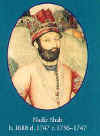|
|
||||
|
Tibetan
Medicine - Tibetan
medicine - How
Maha
Kumbh
Heritage
- Ritu
Kumar - Designing
Exhibition
|
|
|
||
|
the-south-asian.com December 2000 |
||||
|
Delhi Under the Mughals 1701 - 1800
1707 - 1712 - Bahadur Shah I (Aurangzeb's eldest son)
- military campaigns exhausted the treasury. Nobility turned against him. 1712 - 1713 - Jahandar Shah - lost interest in the
administration of his empire. 1713 - 1719 - Farrukhsiyar - disintegration of the
empire during his time. 1719 - 1748 - Muhammad Shah - rise of regional
opposition groups. During his time Nadir Shah invaded India. 1748 - 1754 - Ahmad Shah Bahadur 1753-1754 Safdarjang's tomb built soon after his
death. 1754 - 1759 - Alamgir II 1756-57 - Afghan ruler Ahmad Shah raided Delhi in
winter of 1756-57 1760-1806 - Emperor Shah Alam reigned Delhi
from1760-1806. Brave, cultured, intelligent, spoke 4 languages, harem of 500
women, sightless – eyes gauged out by Ghulam Qadir in 1788, an Afghan
marauder. Sports and court amusements – partridge and elephant
fights People of note in Delhi 1701 - 1800 Shah Wali Ullah 1703 – 1762 – lived in Delhi.
Sufi of Naqshbandi order. Aim to check the spiritual and political decline
of Islam in India. "Translated the Quran into Persian, wrote Quranic
commentaries and works on theology and jurisprudence. Attempted to show that
Sufism was in accord with Islam. No influence in his own time but became
important source of Islamic social and political thought in 19th
and 20th centuries in India and Pakistan." Khwaja Mir Dard 1720 – 1785 son of a Naqshbandi
teacher of Delhi. Became an ascetic and recognised as a spiritual leader of
both Naqshbandi and Chishti orders. Wrote both poetry and prose in Persian
but remembered best as "pillar" of Urdu poetry Poets of Delhi 1701 - 1800 Abru [1692-1747] one of the earliest poets who wrote
under the influence of Vali. Sauda, Mir, Mir Dard and Jan Mazhar[1700-1781]
the Four Pillars of Urdu poetry according to critics. Mazhar the first
poet in Urdu – historical importance . Mirza Mohammad Rafi Sauda b 1713-1780. Raised Urdu to
the status of a literary language Mohammad Taqi Mir 1722- 1810 – born Akbarabad and
died in Lucknow. Came to Delhi. Poetry on Delhi after sacking of Delhi by
Nadir Shah – realism in poetry Khwaja Mir Dard b 1719- 1785 born in Delhi –
introduced concept of mushaira – assembled poets of Delhi including
Sauda, Mir, and Soz. After the mushaira, held discussions on
language. Mir Dard’s younger brother Mir Asar also a poet of
repute but not so well known. Other poets of the time Shah Abdul Latif 1689-1752 born in Hyderabad, Sind
joined a group of wandering yogis and settled in Bhit where his tomb is a
revered shrine. His verses in Sindhi sung to Indian melodies remain very
popular. Bulleh Shah 1680- 1752 – one of the most admired
Punjabi sufi poets. Also wrote in Persian prose and was drawn to the
philosophy of the Vedanta. Waris Shah 1730-1790 wrote in Punjabi using language
and metaphors of earthly love. Literature and texts 1701 -1800 Muraqqa e Dehli – account of Delhi by Dargah
Quli Khan from Deccan who visited Delhi from 1737-1741 [ Safdarjang’s
time] as part of entourage of Safdarjang’s great rival Asaf Jah the first
Nizam of Hyderabad. Gossipy book about dancers and courtesans. Most famous
courtesan was Nur Bai. Accounts of English in Delhi – Lt William Franklin ‘Asiatic
Researches’ published in Calcutta in 1795. Delhi 1801- 1858 1803 - Occupation of Delhi by Lord Lake. Imperial
power became non-existent. The Emperor Shah Alam and his 2 successors were
referred to as King of Delhi 1806 - 1837 - Akbar II 1837 - 1858 - Bahadur Shah Zafar came to the throne
in 1837 when he was little over 60. The last of the Mughal emperors –
author of 4 divans. 1857 – Uprising for national liberation. Massacres
and hangings. Recapture of Delhi by the British on 14 Sept 1857 led to
massive destruction of the city. Red Fort plundered and razed – became
British barracks. Jama Masjid saved on time – would have been replaced by
a cathedral. 3000 Delhites tried and executed. Inhabitants of Delhi were all
turned out of the gates to starve in the countryside. British atrocities.
Bahadur Shah II arrested. 1858 – the last emperor Bahadur Shah Zafar sent off
to Rangoon in exile on bullock cart. The princes, his children were all
shot. Poets of the time Shaikh Mohammad Ibrahim Zauq b 1789 – 1854 -one of
the leading poets of Delhi in his time. Loved Delhi. Emperor’s perceptor. Momin – 1800-1851 Medieval Urdu poetry came to an end with Zauq, Momin and
Ghalib. |
||||
| Copyright © 2000 [the-south-asian.com]. Intellectual Property. All rights reserved. | ||||
| Home |


